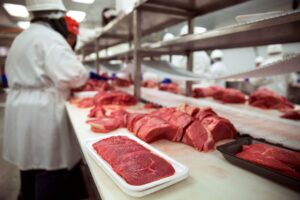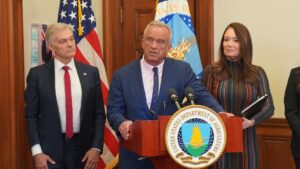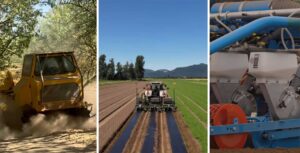Subscribe to Updates
Get the latest agriculture news and updates directly to your inbox.
Author: staff
The year is 1985, and Thomas Marshall and Jane Armstead are on their way to the Farm Science Review in the back of a Ford Pinto station wagon as strangers. Fast forward to today, and they have been married for 37 years, with five children and nine grandkids. Thomas and Jane Marshall are my parents, and the Farm Science Review is not just one of my favorite times of the year — it’s what brought my parents together. It’s also the backdrop to some of my favorite memories, including some made just last week. The Farm Science Review, which wrapped…
By Joshua Haiar MITCHELL — Cody Kafka had dreamed of farming his own land since he began working on a farm in his teens, but that seemed unlikely without land to inherit. So it felt good when he finally walked across his own acres for the first time this year. “It was one of the most freeing feelings I’ve ever really felt,” Kafka said. He owed the feeling to a little-known program administered by the state. Kafka and his wife, Codi, who live in Alexandria, started thinking seriously about getting into farming last year. But finding a lender was difficult…
Hundreds of women gathered in Orlando for the Women in Agribusiness Summit. Agri-Pulse Newsmakers spoke with Alejandra Castillo from the North American Export Grain Association about how the ag sector could be affected by port fees set to go into effect Oct. 14. Polly Ruhland with FTI Consulting was asked about the shifting dynamic between food producers and consumers, and Maria McWhorter from Kynetec discussed farmers’ views of the farm economy.Sara Neagu-Reed was awarded the Women in Agribusiness Demeter Award of Excellence at the event. She discussed how her upbringing in Oakland, California, and roots in Romania have guided her…
By Anna Kaminski KANSAS CITY, Missouri — U.S. Department of Agriculture Secretary Brooke Rollins announced Thursday plans to boost American farmers by purchasing millions of bushels of crops. In an effort to increase American exports, the USDA will purchase 417,000 metric tons of commodities immediately to support the international food aid programs. That’s equivalent to more than 16 million bushels of corn and sorghum. Rollins made the announcement during a speech that earned a standing ovation at the Ag Outlook Forum in Kansas City, Missouri, where she outlined the Trump administration’s efforts to aid a struggling farm economy. “The cost…
By Jacob Orledge A South Dakota lobbyist hinted this week that Summit Carbon Solutions’ plan to build a 2,000-mile carbon dioxide pipeline is on life support without the ability to secure easements through eminent domain. Pipeline opponents in his state, according to David Owen, president of the South Dakota Chamber of Commerce before retiring earlier this year, have argued Summit is free to move forward with the carbon dioxide pipeline that would bring 18.5 million tons of carbon dioxide to North Dakota annually. Some have said that while the company can no longer use eminent domain to secure the pipeline…
By Jonathan Coppess and Otto Doering Maybe history can provide handrails in turbulent, difficult times. For many farmers, this harvest season threatens such times. Some of the crops being combined in fields lack the market demand expected at planting because the Trump Administration’s tariff policies and trade conflicts have damaged commodity exports (farmdoc daily, Sept. 22, 2025; Huneke and Johnson, Sept. 20, 2025; Bradner, Seger, Robertson, and Herb, Sept. 20, 2025; Rappeport, Sept. 15, 2025; Cao, Thukral, and Plume, Sept. 10, 2025; Bradsher, Sept. 4, 2025; Thukral and Cao, Aug. 13, 2025; Gowen and Carioti, May 21, 2025; Rappeport, April 10, 2025; American Soybean Association, Aug. 20, 2025; Huneke and…
By Wesley Muller More than a month after a major industrial fire in Tangipahoa Parish, Louisiana, the U.S. Environmental Protection Agency has released an inventory list identifying the millions of gallons of motor oils, automotive fluids, and other petrochemical products at the site. The information was made public Thursday, hours after the Illuminator reported the agency was waiting on permission from the executives of the Smitty’s Supply Inc. plant in Roseland that was destroyed in an Aug. 22 chemical fire that took two weeks to completely extinguish. The explosion and blaze sent smoke, soot and oily residue into the air and onto nearby homes,…
A 17-year-old Marion County farm boy who was the subject of a Florida Amber Alert has been found safe, according to emerging news reports. The Marion County Sheriff’s Office confirmed Friday afternoon that Caden Rex Speight of Dunnellon was located in Williston, ending an overnight search that included an abandoned vehicle, gunfire, and fears of a kidnapping. WTSP reported that deputies first began searching for Speight on Thursday after responding to reports of a shooting in the 12800 block of Southwest Highway 484 around 4:10 p.m. At the scene, investigators found a truck registered to the teenager, but he was…
By Jeff Beach A North Dakota agency has approved a permit for what could become the largest dairy in state history — a 25,000-cow milking operation in Traill County. The North Dakota Department of Environmental Quality is issuing the permit for Riverview Dairy at a site near the Red River southeast of Hillsboro. Riverview, based in Morris, Minnesota, plans to build two large dairies on the North Dakota side of the Red River that could quadruple the number of dairy cows in the state. North Dakota’s dairy industry has been dwindling for decades. Riverview had already obtained an environmental permit for a 12,500-cow dairy…
By Ella Cao and Naveen Thukral BEIJING/SINGAPORE, Sept. 26 (Reuters) – Around 40 Argentine soybean cargoes were registered for export in November and December during this week’s export tax suspension, mostly headed to China, two traders told Reuters, in purchases that directly eat into the prime U.S. marketing season. A total of 2.66 million tons of soybeans were registered for November and December, accounting for more than 50% of the 5.1 million tons of total volume booked for all months cited by Argentine officials during the tax-free window, the two Asian traders said on Friday. The buying frenzy by Chinese importers this…







:max_bytes(150000):strip_icc()/IMG_7875-f818a7971d0741cda142ee4d2995f886.jpeg)
:max_bytes(150000):strip_icc()/IMG_0696-2048x1536-3d00e45ae1e14d539d1e5d294a3bde59.jpg)
:max_bytes(150000):strip_icc()/ArtWager-2208205788-006e2ac16c604c2c97a8a6c94fbd55c8.jpg)
:max_bytes(150000):strip_icc()/rollins-4-2048x1152-7d769531e3894b6eba914de2b14bcec7.jpg)
:max_bytes(150000):strip_icc()/IMG_9640edit-2048x1439-131c1545e807426281bfbd2cf2edd738.jpg)
:max_bytes(150000):strip_icc()/1edit_farm_field-e3286378d23043ab86d09830a0beea49.jpg)
:max_bytes(150000):strip_icc()/Smitty-fire-3-4ba6e87a9295445e84bdfe10dd4741ab.jpg)

:max_bytes(150000):strip_icc()/Riverview_cows_2-2048x1365-0c071b354ef445468047a8b1337caa7e.jpg)
:max_bytes(150000):strip_icc()/100901867_soybeans-60844bfb2b68432a8447f18fa34d28b5.jpg)